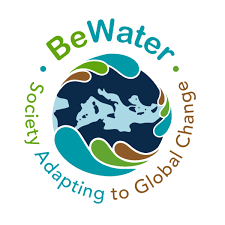
BEWATER – Making society an active participant in water adaptation to global change
Good Practices Category
Good Practices Summary
Talking to people for a resilient society: BEWATER uses an iterative process of mutual learning, participatory techniques and a bottom-up approach to ensure that stakeholders play an active role in determining appropriate strategies for management of river basins. Results and guidance from BEWATER’s participatory approach may be useful for the development of wider environmental policies, such as resource management, that benefit from the contribution of citizen decision making, ultimately building more resilient territories.
Mitigation
Sustainable water management under climate change is an urgent challenge for the Euro-Mediterranean region. Future climate change projections estimate an increase in water scarcity and droughts in the region, causing substantial socioeconomic losses and environmental impacts. In this context, efforts are needed to strengthen public participation and embed a sense of responsibility within the society concerning water management and adaptation towards these threats. The combination of improved awareness, mutual learning processes and shared responsibility of the civil society and stakeholders are key to ensuring successful adaptation strategies and their implementation, leading to increased resilience of the social-ecological system of a river basin.
Replicability/Knowledge Transfer
Using an innovative participatory approach, citizens from around the Mediterranean were involved in adaptation planning for the management of their local river basin in light of global change. The participatory approach applied is not only replicable in other Mediterranean river basins, but could be used to apply participatory adaptation planning in river basins across Europe and beyond. The results have been translated into generic adaptation guidelines that can be adopted in other river basins and results will be disseminated in a targeted and strategic way.
Resources
BEWATER researchers worked with the project stakeholders to create River Basin Adaptation Plans (RBAP) for the four selected case study locations: Tordera (Spain), Pedieos (Cyprus), Rmel (Tunisia) and Vipava (Slovenia).
In the four Case Study River Basins across the Mediterranean, newly developed methodologies integrating physical, ecological, social and management processes were used to develop Water Management Options. These Management Options were discussed with local communities who participate in drawing up locally-relevant Adaptation Plans, which may be scaled up to develop guidelines of national and international relevance.
Target Audience
Policy Implications
Anchoring adaptation planning on competent political processes and fostering the ownership and leadership of decision makers who are accountable for the ask are key elements in order to move towards implementation. The role of local authorities, such as municipalities, is crucial in the design, implementation and monitoring of adaptation actions.
Social Dimension
The BEWATER project promotes dialogue and collaboration between science and society for sustainable water management and adaptation to the impacts of global change in the Mediterranean. By actively engaging with local communities, the project involved society in discussions on current water uses and their related problems, raising public awareness of the importance of sustainable water management, with particular focus on the expected climate change impacts at River Basin scale. There is increasing recognition of the value and importance of co-creation in adaptation planning – the approach developed in the project-, in which stakeholders engage in a collaborative process with scientists and experts to develop river basin adaptation planning, uses cocreation to take up both scientific insight and stakeholder interests in the final plans.
Innovation Type
Awareness, Methodology, Process, SocialInnovation
The project leads to innovation as a result of effective integration of local experience and research. To engage participants, BEWATER adopted the Stakeholder Integrated Research (STIR) approach, specifically tailored to climate change adaptation. Guided by STIR, stakeholders for each river basin were identified using the Criteria-Quota-Individuals method, which ensured sufficient group diversity, in terms of their areas of expertise (agriculture, infrastructure, water, environment, energy, forest management), organisational affiliations (business and economy; government and public authorities; civil society; practitioners) and gender.
Outcome/Barriers
Participatory adaption planning for river basins is still a developing concept and could benefit greatly from wider application across a range of basins and the subsequent sharing of best practices and experiences learned. Assessment methods need to be adjusted to local contexts, available data, and stages in the adaptation policy cycle. Stakeholder processes have to be managed carefully, as discussions can be unduly influenced, captured, or even ‘hijacked’ by particular interests.

